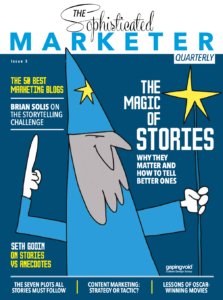Guest post by Mark W. Schaefer (@markwschaefer)
I hate the term “personal branding.”
And yet, personal branding may be the salvation of corporate marketing.
Allow me to explain today why both statements are true!
For the past few years I’ve been immersed in the world of personal branding as I wrote my new book KNOWN: The Handbook for Building and Unleashing Your Personal Brand in the Digital Age. I started the process by exploring what the experts thought it meant to build a brand — and what I found was pretty disappointing. I found a lot of hype like:
- “If you can dream it, you can be it.”
- “Find your passion, find your life.”
- “Nothing is more important than hustle.”
In other words, there’s a lot of fluff out there, which is why I had always detested the word “personal branding.” It’s become meaningless. For those of you who have been in business for a while, you know the world doesn’t run on fluffy mantras. In fact, the actual research shows that pursuing a dream without a plan is nearly always a recipe for failure.
The lack of a coherent and data-based approach to personal branding is the primary reason I wrote my new book. I wanted to explore this question: Can anybody become known? And I wanted to answer it in a practical and scientific manner. How do real people in the real world become known?
To be clear, being “known” is not the same as being famous. It’s not about having millions of fans and red carpet appearances. Being known is about approaching your web presence with an intent that creates the proper authority, reputation, and audience to realize your potential and achieve your goals … whatever they might be.
To answer this question “can anybody become known?” I did months of academic research and then interviewed about 100 people who are “known” in their field. I talked to people who are regarded as thought leaders in education, real estate, retail, construction, business, medicine, finance, fashion, music, art, and many more. I talked to people in Africa, Asia, Brazil, Canada, Australia, America, Mexico, Europe, and the Middle East.
And this is what I found. Every person, in every field, in every country did exactly the same four things to become known:
- They found a distinctive sustainable interest (which is different from a “passion”).
- They found an un-contested space to publish content.
- The created excellent content consistently, for years.
- They worked tirelessly to nurture an audience big enough to matter.
I’m convinced that with some introspection and effort, you can create a tailored plan exactly right for you, and that you (yes, YOU!) can become known.
And that leads me to my next claim – personal branding may be the salvation of corporate marketing. There has been increasing research showing that consumers are less brand-loyal than they were even a few years ago. In some respects, marketers have brought this on themselves with a regimen of invasive advertising, privacy breaches, and sneaky schemes to get people to click a link.
Loyalty – the historic Holy Grail of Marketing — is less important as we reference perfect information in the palm of our hand to discover the daily best deal and free delivery, no matter where it comes from.
What’s left if we don’t have loyalty? Maybe in the hyper-connected world we need to think beyond loyalty and start to consider the penultimate consumer emotion — love.
We normally don’t fall in love with a logo, a slogan, or a quarterly financial statement. We fall in love with people. This leaves us two choices if we want to achieve brand love.
Option One – We create a brand that literally becomes a “person” we can love. If I say the words “Coca-Cola” or “McDonalds,” you probably don’t think of colored sugar water or slim meat on a puffy white bun. These companies have spent millions of dollars over decades to become a person to you. We can love them because these companies have a personality that lives in our mind. Polar bears. Santa Claus. Ronald McDonald. That’s the same reason we love Nike or Disney. These brands have become “people.”
But we probably don’t love Acme Tax Planning or XYZ Auto Repair. They don’t have the luxury, the millions in ad spending, or the time to become a person in our brains.
So, that leaves Option Two. We need customers to love people. REAL people. OUR people. How do we get real, passionate employees out in front of the world?
My friend Robert Kovach is a senior HR leader at tech giant Cisco. He once told me that he regarded the ability to have a profound social media presence as a life skill. He theorizes that to the extent that a company could encourage this life skill, it will enable its own corporate connection and humanity in the marketplace. A powerful idea.
And that brings us back to the personal brand. A lot has been written about employee advocacy programs, but so far this has involved little more than using employees, feeding them well-timed tweets, and leveraging a cumulative social media presence to boost our PR department’s vanity metrics.
But what if we actively, mindfully, and persistently encouraged selected employees to radically boost their personal brands … to become known in their field? Becoming known is the only permanent and sustainable advantage we can create for ourselves as individuals today. If we did this over an entire company – established a company of “knowns,” the possibilities are mind-bending. Over time, the faint ping-ping-ping of the corporate media machine would become human and real and thunderous because of the new employee-fueled power surge.
And maybe, if the world comes to know and love our employees, they would eventually love us, too.
Mark Schaefer is the executive director of Schaefer Marketing Solutions and has written six books including KNOWN. There is also a workbook that accompanies KNOWN with the exercises and bonus content. Both are available through Amazon.





![While AI learns and gets smarter and smarter, I spend my time preparing for the future by… [fill in the blank].
The most important skills of the future are human…
#creativity, #imagination, #individuality, #criticalthinking, #empathy
bit.ly/LifescaleBook 💫
Artist: @asiersanznieto
#promptengineering #prompting #ai #genai #artificialintelligence #keynotespeaker #motivationalspeaker #motivational #motivation #education #learning #leadership #leader](https://briansolis.com/wp-content/plugins/instagram-feed/img/placeholder.png)
Hi Mark,
Very interesting points! And I do agree with them!
To me, personal branding is a subject that I find very interesting because there’s no doubt that people resonate better with REAL humans.
People don’t want to talk to a logo and a brand name when talking to a brand. They want to talk to REAL people which they can conversate and build relationships with.
Thanks a lot for giving your take on this!
Jaylene